Events
Have a look at all our past events for an idea of what we do at the History Society!
MUSEUM MILE
When you think about London and its plethora of museums, one is automatically inclined to think about the British Museum or the Natural History Museum, rather than the Free Masonry, Cartoon, and Hunterian. The QMUL History Society, spent a rainy Saturday exploring these historical gems and more, which are unknown to tourists and forgotten by regular museum-goers. Here are our favourite two:
First up was the Cartoon Museum, located in the heart of Bloomsbury, is a very cool place, showcasing a wide range of fantastic art. These included well-loved characters seen in comic books and on television, as well as both political and satirical pieces. The museum not only allows you to develop the knowledge you already have, but to explore the hidden history – which may surprise you – about even the most famous of cartoon characters! Though not free, admission is only £3 for students, which we think is still a great deal for access to some historical art which is cemented in pop culture.
Second on our list was the Free Masonry Museum, just a short walk from Holborn tube station. Freemasonry was a secret organisation which has existed for year, and this museum even helps you look into the masonic history of your family or friend – so if secrecy and curiosity is your thing, head on down and see what secrets you can uncover! They also have a range of pottery, silverware, and furniture, and regalia on display, if delving into the your own past isn’t your cup of tea.
Both of these museums are just a short walk from each other, and are also a part of the ‘Museum Mile’, a collection of thirteen of London’s best museums, only a thirty minute walk between them. I’d hugely recommend you going to visit at least one, to see what London’s historical scene has to offer – you never know what you might learn…
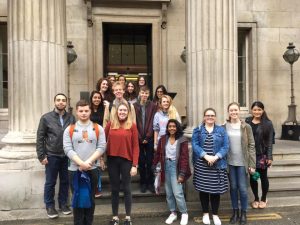
History Society outside the Hunterian
Rumba and Repression: Life in Zaire 1965-1997 with Dr. Reuben Loffman
“Black history is all of our histories”
In the midst of Black History Month they are powerful words, spoken by Dr Reuben Loffman, which are extremely important to keep in mind when looking at history and society as a whole.
Zaire, which is now the Democratic Republic of Congo, has a history which is often not studied within the conventional history curriculum. However, Reuben showed us how the politics of Zaire was closely tied into Cold War politics, which we normally see a war which ultimately involved the West and the Soviet Union. Therefore, the history of Zaire is extremely important in understand not only, the Sub-Saharan African continent, but also Western Capitalist Democracies.
Therefore, the history of Zaire, brilliantly told by Reuben, is a history which all of us should explore. A brilliant glimpse at Reuben’s special subject; it is a topic which has many different avenues which need to be explored further.
A very interesting and enlightening talk about Dr.Loffman’s special subject: “Heart of Darkness”. This is a very interesting piece of history , is very intriguing and eye opening subject to study.
Map and Flag of Zaire
Bletchley Park
On Saturday 22nd of October the History Society visited Bletchley Park – ‘the home of the codebreakers’ – for our second historical day out of the year. The park doesn’t look like much from the outside, but the buildings contained the people and machines which helped break the German Enigma code, and possibly shortened the second world war by three years, and aided the destruction of Nazism.
We travelled to Bletchley station via train, as many of the academics, soldiers and Wrens would have done. Bletchley was chosen as it was close enough to London for personell to be able to travel there whilst escaping the Blitz. The park is home to several unique objects – such as Mussolini’s personal Enigma machine and the teddy bear on which Alan Turing used to practice his lecturing.
Following our film screening of the Imitation game on Wednesday, it was great to see an exhibition of the costumes and props of the film. We also met a tour guide who had been at Bletchley during the war. Thanks to the film, the Park was redeveloped in 2014 to renovate and recreate several huts, many of which were destroyed and disused after the second world war. Our admiration for the innovation and genius of the codebreakers, particularly Alan Turing, who was so poorly treated after the war, was increased exponentially. Turing was instrumental in the creation of the bombe machine which was able to calculate the 159 million million possibilities of the German cypher. It also led to the development of the world’s first electronic computer.
Turing was sentenced to ‘gross indecency’ for homosexuality in 1952, and was forcibly castrated with artificial oestrogen. He killed himself on the 8th of June 1954. Turing was officially pardoned post-humously in 2013. If you want to find out more about Bletchley Park, the History society recommends the book ‘the Secret Life of Bletchley Park’, by Sinclair McKay.
Thankyou to everyone who came on the trip, we really enjoyed meeting you all. We especially want to thank the non-history students who came out of interest. We hope you enjoyed yourselves, and we look forward to seeing you all at our future events!
We would also like the thank the School of History for their help in the planning and funding of the trip.
“The world is an infinitely better place because you are not normal.” – The Imitation Game
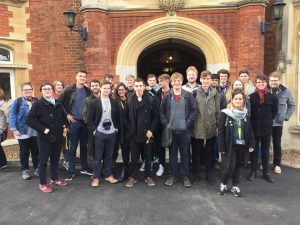
Dr Harriet Harvey-Wood: The Battle of Hastings 1066
On the 14th of October 1066, two armies met in battle on Hastings hill. The forces of William the Conquerer, also known as the bastard due to his illegitimacy, and Harold II clashed and changed the nature of the English throne forever. Harold would be killed, and William I crowned in London on Christmas day 1066.
The battle was a close run thing, with rumours spread amongst the Normans that William had been killed. They retreated, and the Anglo-Saxon forces swept after them, only to be caught in a Norman feigned retreat. William’s forces managed to defeat the Saxons, and go on to conquer the kingdom of England.
Therefore, when Dr. Harriet Harvey Wood came to speak to this QMUL History Society about this very event it became a very interesting topic of discussion. Not only did Dr. Harvey Wood talk about ‘The Battle of Hastings’ itself, but also the history preceding this very event. She, with the aid of our own Dr. Andrew Buck, illuminated this period, which is often untold and forgotten in our narrative of British History.
Dr. Harriet Harvey Wood’s book, ‘The Battle of Hastings: The Fall of Anglo-Saxon England‘, therefore, not only creates a lens in which to view this important period but also allows the reader to fall in love with Anglo-Saxon England and its subsequent fall.
The History Society would like to thank Dr. Harriet Harvey Wood for coming to talk to us, and Dr. Andrew Buck who chaired the event.
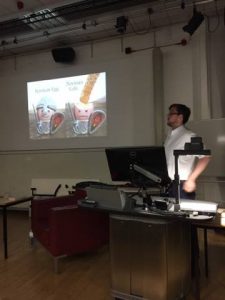
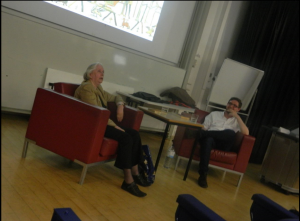
An Evening with Andrew Marr
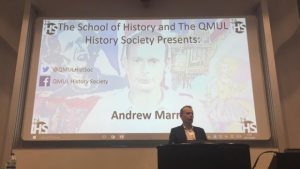
On the 23rd of November the History Society welcomed Andrew Marr to QMUL. It was an amazing event which saw Marr talk on a variety of topics which are currently all shaping the world we live in. From Brexit, to Trump to Le Pen, Marr tried to shine some light on the global events which have happened throughout 2016.
In an article written by Maariyah Dawood, in the QMUL Newspaper, ‘The Print’ , she brilliant describe the event:
“Marr, who has authored and presented history books and documentaries, said history was about ‘the important questions and conundrums’, with Brexit being the most important today. He said he called the referendum correctly because he left London to film and was outside the ‘Westminster bubble’, where there was a sense that the government and political class were part of a corrupt, incompetent elite. He described Brexit as a ‘fundamentally economic rebellion by the working classes left behind by capitalism, citing issues such as the MPs expenses, the hacking scandal and the 2008 financial crash as explainers, claiming the latter left an “…anger that burned on undetected under discussed”…
Marr went on to talk about the Brexit negotiations, stating it will be “mind dazzlingly complicated” and claimed that the government is not being honest about this in public by giving empty statements such as “getting the best deal possible for the country”. He predicted the likelihood of a general election next year as he “can’t see how Theresa May can her version of Brexit through the Commons otherwise”. Whilst many are sceptical over a victory for the Labour party under Jeremy Corbyn, Marr suggested it was “completely possible in a time of revolt and rebellion”….
The lecture was followed by a lively question and answer session, with many students eager to gain Marr’s insight in to issues varying from the parallels in the causes of nationalism between now and the 1930s, the role of centrist parties, identity politics, as well as his tips on getting in to journalism.”
A great article, which really outlines the main issues expressed in Marr’s talk. The event left everyone who was there pondering the future of politics in a global way and gave many an insight into the trials and tribulations which have been seen throughout 2016. Furthermore, given that Marr is both a journalist and an historian it was interesting to see how the two field combine in such a harmonise was and the impact that has on how we look at history! Overall, Andrew Marr, left the audience questioning what exactly is going to happen next?
This event was a great success and we’d like to thank The School of History for their help in organising the event! Furthermore, thank you to Andrew Marr for agree to take time out of his busy schedule to talk to us!
Thanks to all that came!
Best,
The History Society
Miss World Protest (1970)
In 1970, activists from the Women’s Liberation Movement caused a public stir at a Miss World pageant at the Royal Albert Hall. Organised to challenge the assumptions behind the show, its connections with big business, and the association between the event compère, Bob Hope, and the American intervention in Vietnam, the WLM were speaking out against the organisers and the press who publicised it. Their slogan was ‘We’re not beautiful, we’re not ugly, we’re angry!’.
Therefore, being joined by Sue Finch and Jenny Fortune was an amazing experience. Hearing their personal experiences at this pivotal moment in the movement for women’s equality was both inspiring and interesting to hear.
Sue Finch is a feminist peace activist who is part of Women in Black, a world-wide network of women committed to peace with justice, and actively opposed to injustice, war, militarism and other forms of violence. At the time of this protest she was 9 months pregnant.
Jenny Fortune was arrested at the Miss World demo and found guilty after a collective self-defence with 2 other women charged. She found it an overwhelmingly empowering experience. She became active in the Claimants Union and in housing politics in east London – campaigning for women’s right to housing in their own names.
Hearing the experiences of women who were very much involved in the fight for equality made this event one of the best of the year! We hope all our members enjoyed the event also!
Thank you for coming!
Best,
The History Society
The 2016 Presidential Election in Historical Perspective
On the 20th January 2017, America had yet another President, a President which some of the Country ardently protested against. However, what does Trump’s elections tell us about America, and its past? Is Trumpian politics an unique phenomena, or is it a re-occurring theme across America history? And what lays ahead for the future of one of the world most powerful nations? Our very own, Dr. Erik Mathisen tried to answer these questions as well as a variety of others to assess the historical significance of the Presidential Election of 2016.
Dr. Mathisen looked at the long history of populist movements throughout the United States and how we should not be surprised by the election of Donald Trump. He highlighted very important questions about why it is that Trump gained such support, but also why Clinton lost the election. Maybe it is more apt to say that the Democrats lost the election, rather than the Republicans won….
This was a very important and incredible insightful event which highlighted some important historical truths about the 2016 election, whilst also posing some important questions about what Trumps presidency will look like, and how the Democrats can recover.
Thank you to everyone that came, and a special thank you to Dr. Erik Mathisen for hosting such an amazing event.
Best Wishes,
The History Society.
Geography, Flags and Identity in an Age of Nationalism
In today’s world there is a renewed sense of nationalism seen across the globe, from the troubled identities in Europe and the USA to the rise of the Islamic State.
Tim Marshall explored how geography, ideology and identity has shaped our perception of the world. He offered a new perspective to understand the political context of many of the most devastating conflicts in modern history. One notable example Marshall mentioned was that Russia need Crimea due to its access to ship ports all year rounds, something Russia would not have without Crimea. As a results, Marshall adds amazing perspective on political events and how geography can help us understand a more global world.
Marshall is a British journalist, author and broadcaster with more than twenty-five years of reporting experience. He was diplomatic editor at Sky News, and before that worked for the BBC. He has reported from forty countries and covered conflicts in Croatia, Bosnia, Macedonia, Kosovo, Afghanistan, Iraq, Lebanon, Syria, and Israel. He is the author of the New York Times bestseller ‘Prisoners of Geography: Ten Maps that Tell You Everything You Need to Know About Global Politics’ and ‘A Flag Worth Dying For: The Power and Politics of National Symbols’.
